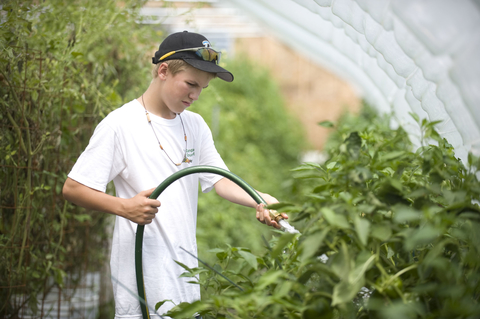Get ready to learn more about agronomy, ag technology, crops, plant and soil science, weeds and pests!
What can you do?
In the plant science project, you can:
- Explore ag technology and how it has improved farming practices, changed farming, improved farmers' resources, etc.
- Investigate how cross-pollination works.
- Discover how plants are used other than for food.
- Learn about the impacts certain weeds and pests can have on the farming industry.
These are just some of the many ways you can participate in this project.
Project information
Get started with 4-H'ers in your area
- Contact your local 4-H office for more info.
Get started on your own
- Begin your project learning with the plant science project resource guide.
- Reflect on your project and what you've learned using 4-H record keeping.
Get updates
Want to be notified of program updates? Sign up for the Minnesota 4-H plant sciences listserv at the button below to stay connected.
Crop Scouting
In this activity, teams of youth compete on their ability to assess crops for outcomes and risks like weeds and pests.
Teams can be only 4-H or FFA, 4-H and FFA mixed, and/or multiple clubs or counties.
- Junior division - Individuals in grades 3-5.
- Intermediate team - A team of 3-5 youth in grades 6-8.
- Senior team - A team of 3-5 youth in grade 9 and above.
Plant Science Project Bowl
Plant Science Project Bowl will be held again this year for youth in grades 3 and up. There will be one competition at the state bowl event on April 6.
4-H Agriculture Ambassadors
This opportunity is for youth in grades 10 -12. The 4-H agriculture ambassadors are a voice for youth in agriculture and 4-H.
Youth serve Oct. 1 - Sept. 30; applications open August of the current year for the following 4-H year.
4-H Agronomy Days
Experience a college classroom! Explore a college and learn from a faculty member. There will be time in the day for tours and asking all your questions about classes and college majors. This is a great way for you to learn more about the study of agronomy and college life.
4-H Agronomy Tours
If you are interested in agronomy and horticulture, you could do them as a career. Attending a 4-H agronomy tour at an ethanol plant, large-scale dairy operation or seed plant will give you an idea of jobs for you in the future.
4-H project and career connection
Check out career opportunities in the agronomy, horticulture and plant science industry to learn how to connect your project learning to a future career.
Project opportunities near you
Get in touch with your local 4-H office to learn about plant science project events and activities in your area.
Interested in getting involved as a plant science project volunteer?
Contact your local 4-H office or learn more about volunteering in 4-H.
Resources for supporting youth in plant science
Gardening and agriculture lessons and activities in the youth development curriculum library
Things That Grow by PBS Kids for Parents
Plant experiments by 123HomeSchool4Me
Diggin' grain farming a Minnesota family shares their stories of grain farming
Plant science project resources for volunteers
Find training and more support for volunteers on our 4-H Volunteer Resource Center site.
Fair information
What does it mean to show at the fair?
For 4-H'ers, local and state showcase events (like the Minnesota State Fair) are not just fun events. They provide youth opportunities to exhibit the knowledge and skills they've gained throughout the year– and to continue their learning.
Contact your local 4-H office for plant science project showcase opportunities near you.
Exhibit ideas and judging criteria
Get exhibit ideas and find out what the judge is looking for in the evaluation sheets:
- Ag tech, weeds and pests
- Corn, small grains, legumes, soybeans and specialty crops
- Forages
- Plant and soil science
Find more exhibit ideas in Agronomy exhibits: Bringing the field to the fair.
Reviewed in 2022


